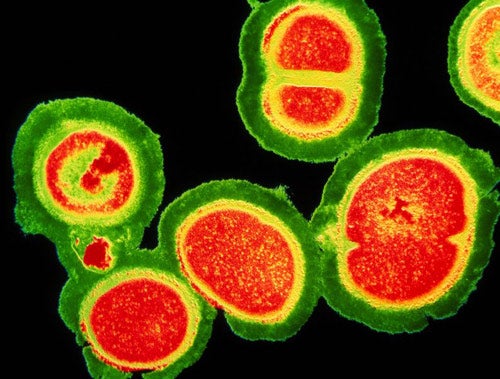Flesh-eating bug strikes San Francisco's gay community

Your support helps us to tell the story
From reproductive rights to climate change to Big Tech, The Independent is on the ground when the story is developing. Whether it's investigating the financials of Elon Musk's pro-Trump PAC or producing our latest documentary, 'The A Word', which shines a light on the American women fighting for reproductive rights, we know how important it is to parse out the facts from the messaging.
At such a critical moment in US history, we need reporters on the ground. Your donation allows us to keep sending journalists to speak to both sides of the story.
The Independent is trusted by Americans across the entire political spectrum. And unlike many other quality news outlets, we choose not to lock Americans out of our reporting and analysis with paywalls. We believe quality journalism should be available to everyone, paid for by those who can afford it.
Your support makes all the difference.A lethal strain of the MRSA superbug that can develop into a flesh-eating form of pneumonia has struck San Francisco's gay population.
The Castro district of the city, which has a higher gay population than anywhere else in the US, has been hardest hit, according to a study, but the infection has also been found in gay men in Boston, New York and Los Angeles.
Scientists say the incidence of the deadly infection is 13 times higher among homosexual men than in heterosexual people in San Francisco, and is resistant to most antibiotics. The bug causes boils and abscesses and can lead to necrotising pneumonia, which eats away the lungs, and necrotising fasciitis, which destroys the flesh.
In the Castro district, one in 588 people is carrying the bug compared to a rate of one in 3,800 in the general city population.
The researchers have stopped short of describing it as a sexually transmitted disease. The infections are found where skin to skin contact occurs, including sexual activity.
The potent strain of MRSA, known as USA300, was first identified in the US in 2001 and is now the commonest form of the infection transmitted in the gay community. It is also prevalent among children, people involved in contact sports, prisoners and others who have vigorous physical contact. It spread to the UK in 2002 but has not been linked here with the gay community.
A spokesperson for the Health Protection Agency said there had been only three cases identified in gay men, two of which were linked and the third was possibly linked.
"It is skin to skin contact, not sexual orientation, that is crucial for it to be passed on," said the spokesperson. "Heterosexuals can get it, too. Anyone involved in contact sports, such as wrestlers, can get it."
Public health specialists have been alarmed by the spread of the strain through the US and into Western Europe because it affects previously healthy people living in the community, unlike hospital-acquired MRSA that targets the sick and vulnerable.
The strain produces a potent toxin, Panton-Valentine leukocidin (PVL), that kills white blood cells, damaging the body's immune system. Doctors fear it could cause mayhem if it spreads into hospitals.
The San Francisco study is published in Annals of Internal Medicine. Binh An Diep, of the San Francisco General Hospital, who led the research, said: "These multi-drug resistant infections often affect gay men at body sites in which skin to skin contact occurs during sexual activities.
"But because the bacteria can be spread by more casual contact, we are also very concerned about a potential spread of this strain into the general population."
He said the best way to avoid transmission was probably to wash thoroughly with soap and water, especially after sex.
One in five infected patients in the US required hospital treatment. The new strains appear to attach themselves to damaged skin and airways more easily than hospital MRSA and the multiply at a faster rate.
Easily spread, drug resistant
* The new superbug is a form of USA 300, a strain of MRSA that is spreadto healthy individuals through skin contact.
* It causes boils and abscesses in places where contact has occured.
* It is resistant to treatment with six antibiotics.
Join our commenting forum
Join thought-provoking conversations, follow other Independent readers and see their replies
Comments